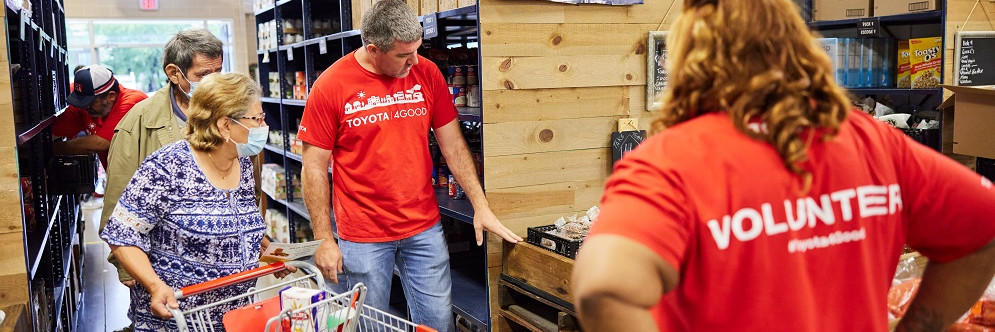
Driving Possibilities Begins by Addressing Basic Needs
Experiencing hunger in any scenario can lead to mental distractions and diminished performance, but, in a school setting, it can be a key difference between academic success and failure.
That is why Dallas ISD, Toyota and SMU are collaborating with Brother Bill’s Helping Hand (BBHH). Together, we are working to improve access to healthy food options for students, their families and all neighbors in the West Dallas community in one very convenient setting — the halls of the new West Dallas STEM School (WDSS).
In 2020, Dallas ISD’s Racial Equity Office allocated funding to create a community center to provide social services, including a food pantry at four schools – one of which will be located inside the STEM school (formerly Pinkston High School). The idea is to create a shopping experience that includes well-stocked shelves and self-serve, grocery-store-style refrigerators and freezers. In addition to the food pantry, there will also be a learning garden, where fresh produce will be grown.
“We are planning for this to be more of a general store,” says BBHH’s executive director Wes Keyes. “We are hoping that some new partnerships will be able to provide supplies in addition to groceries.” Among those supplemental offerings will be a variety of hygiene products and school supplies.
Creating a learning opportunity
The new food pantry/general store will also provide an additional way for students at West Dallas STEM School to learn and engage. “We want the staff to be able to use the space for hands-on experiences that they may not be able to accomplish in their classrooms,” says Blane Rogers, West Dallas STEM School site director for BBHH. “It can be utilized for financial literacy, to learn about service, inventory, supply and demand, ordering, planning, and even careers associated with a grocery or a general store.”
“The students and family of the West Dallas STEM School are looking forward to using the learning garden and general store this year,” Marion Jackson said, principal of WDSS said. “With the local partnership with Brother Bill’s to find the right location, programs and educational prospects, I see both of these projects meeting not only the physical needs of our community, but also the long-term needs through the skills and knowledge developed.
Currently in development, a learning garden will likely launch in tandem with the food pantry/general store. “We are very close,” says Rogers. “It has taken some time to evaluate different sites on campus because we have seen a lot of successful gardens around the area and some that didn't make it long-term. We are trying to find a site that will give students the greatest opportunity to learn as well as have the attributes needed to make it successful for years to come.”
The idea is for the learning garden to serve as the perfect combination of outdoor classroom and functional “mini-farm.” Students will have the opportunity to learn about germination, composting, irrigation, and climate and temperature impacts on plants. And local experts will be called on to share their knowledge of food production with students.
Scaling up Impact
Beyond the four walls of the West Dallas STEM School, Toyota is collaborating with local nonprofits to help improve processes and help more people in need.
“For about 30 years, Toyota has been sharing our production know-how with nonprofits to improve their overall processes,” says Toyota’s Kareem Myers who oversees the food insecurities portion of the company’s initiatives in the West Dallas community. “It’s about sharing knowledge to help nonprofits serve more people in need.
Toyota began working with BBHH during the pandemic to improve processes for a drive-thru food pantry, and then worked with the nonprofit to make the food pantry more efficient.
For Toyota, the effort with BBHH is about addressing basic needs, not just within the West Dallas STEM School, but in the broader community.
This holistic engagement model is what Toyota’s new Driving Possibilities initiative is all about: addressing barriers that impact learning, collaborating with school districts, nonprofits and the community to address before- and after-school programs, and developing or enhancing curriculum to help prepare students for the future.
“West Dallas is the model for our new education and community engagement initiative called Driving Possibilities that we are rolling out in 15 communities across the country,” says Myers. “Whether it’s connecting people through mobility or providing better ways for people to access critical goods and services, together with community partners, we are making an impact and helping set students up for success.”
Though COVID added to the surge to inflation, food insecurity continues to be a top concern in North Texas.
“Food is a basic human right,” says Keyes. “We must never forget this truth. At BBHH, we see food as an on-ramp of sorts that meets an essential need that allows us to present empowerment, learning, and equipping programs for the ones that we serve. Toyota understands this concept and we are proud to call them a powerful collaborator in poverty eradication.”
